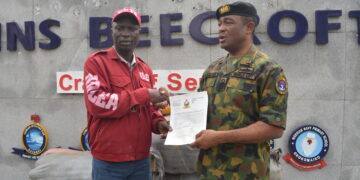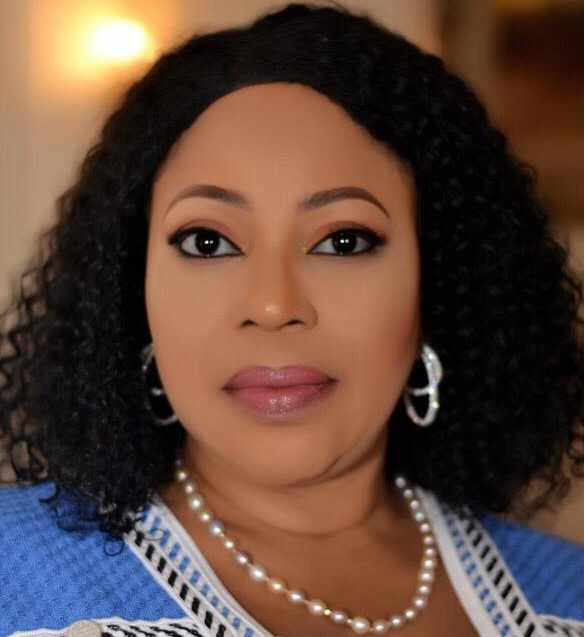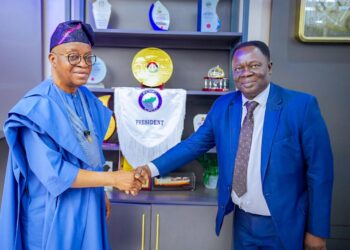- We are installing scanners at ports, says Customs
The Nigeria Customs Service is responsible for the high costs of doing business at the nation’s seaports as a result of its manual processes instead of embracing automation, the Seaport Terminal Operators Association of Nigeria(STOAN) has declared.
The terminal operators said such manual processes were no longer in tune with global trends as automation has become the order of the day, including the West and Central African sub-region.
Chairman of the Seaport STOAN, Princess Dr. Vicky Haastrup who spoke at a Townhall Meeting organised by the League of Maritime Editors and Publishers where she was the Special Guest of Honour said the traditional manual processes which have been prevalent in clearing processes constitutes a lot of bottlenecks in the ports system as well as huge costs to importers.
She disclosed that a “study conducted by Akintola Williams Deloitte in 2017 blamed the high cost of doing business at the nation’s seaports on the Nigeria Customs Service and other government agencies.
“The study stated that Customs processes are responsible for not less than 81.7 per cent of the charges incurred by consignees. It said Shipping Companies are responsible for 13.8 per cent of the port cost; Terminal Operators 1.4 per cent; Transporters 1.4 per cent and Clearing Agents 1.7 per cent.”
“A major reason for the high cost associated with Customs is manual processes,” she said.
Haastrup said manual examination of cargoes has assumed the proportion of an endemic sore point in Nigeria’s Customs administration, adding that the Customs Service performs 100 per cent physical examination on almost all cargoes passing through the ports.
She also disclosed that manual processing of goods clearance by the Customs was the reason why importers and their customs agents troop to the ports on daily basis.
In her paper titled ‘Impact of Automation in Cargo Handling Operation’ under the theme ‘Achieving Effective Digitalization of Nigeria’s Maritime Industry’, she said manual process in goods clearance has been breeding corruption through numerous human contacts.
She said, “This is not efficient and it constitutes a huge drawback to port efficiency. The manual inspection by Customs contributes in no small measure to the high dwell time of cargoes at our ports. It is also the main reason why importers and agents troop to the port daily. This is in addition to breeding corruption through numerous human contacts.”
She was of the view that the solution was for the federal government to engage the private sector, as was done under the previous Destination Inspection scheme, to acquire high-end scanners for use of the Customs Service.
According to her, it was not enough to merely acquire a couple of scanners as government was doing at present.
Besides, she said that the scanners when acquired should not be left in the hands of government officials as they could be grounded in no time.
She said, “A sufficient number of high-end scanners should be acquired to put a definitive end to manual cargo examination. The effective usage and maintenance of the scanners are also critical. Left in the hands of government officials, the scanners may be grounded in no time – as it happened before – and the system will be reset to the manual era.
“The services of risk assessment/management companies should therefore be engaged and retained for the purposes of providing, effectively utilizing and maintaining the scanners. If we are truly desirous of creating efficiency at our ports, manual examination will have to be reduced to less than 10 per cent of the cargoes handled at the port, in line with international best practices.
“ While it has now become possible for importers and licensed Customs agents to make their declarations, obtain the Pre-Arrival Assessment Report (PAAR) and pay import duties online, the resort to manual processes from the point of cargo examination creates a huge dent on the drive for port efficiency.
“From the point of 100% physical examination of cargoes, the discretionary powers of Customs officers kick in. Negotiations and underhand dealings inevitably happen due to unbridled human contact. The solution to this major obstacle is to drive the clearing process from end-to-end with digital technology. The human interface and the discretionary powers of officers should be taken out of the mix.
“Full automation of the clearing process and the deployment of sufficient number of scanners at the port will invariably cut down the multiple checks of cargoes by Customs and other security agencies.”
She added, “Customs processes must be simplified and automated to complement the gains recorded through the Federal Government’s port reforms. The time is ripe to deploy the much talked about National Single Windows and e-Customs to check manual Customs processes and the multiplicity of Customs units deployed all around the ports, the port gates and even on the roads to intercept cargoes already cleared from the port.
“Government must now work with operators to turn our ports to smart ports by deploying a Customs-driven, port-wide, cloud-based software that will create new operational flows, which will eliminate human contacts, expunge all forms of manual processes from the system and help the port function better.”
However, the Comptroller General of Nigeria Customs Service, Rtd. Col Hammed Ali in his presentation said efforts are being made to install scanners in the nation’s ports.
Ali who was represented on the occasion by Mr. A. Richards, an Assistant Controller of Customs said scanners have been acquired for Port Harcourt and Lagos ports and currently being mounted.
He also disclosed that release of cargo has now been centralized, adding that this was aimed at easing the processes of clearing at the ports.
Chairman of the occasion, Otunba Kunle Folarin said Nigeria has been left behind as far as automation of ports was concerned.
Folarin stressed the need for all port operations to be automated, adding that this was the only way to enhance speedy processes of goods clearance out of the ports.
In his speech, the President of League of Maritime Editors and Publishers, Mr. Kingsley Anaroke, said digitalization and new developments in the field of artificial intelligence, blockchain, internet of things (ioT) and automation were becoming increasingly relevant for maritime transportation.
Anaroke who noted that digitalization has a wider range including the idea that all relevant data is provided to all stakeholders in real-time on one open platform to improve efficiency and accurate decision making, he said what stakeholders were asking for in the nation’s ports were mere system automation.
According to him, this was an elementary stage of digitalization given the backwardness and the endemic operational challenges in the maritime industry.
































































